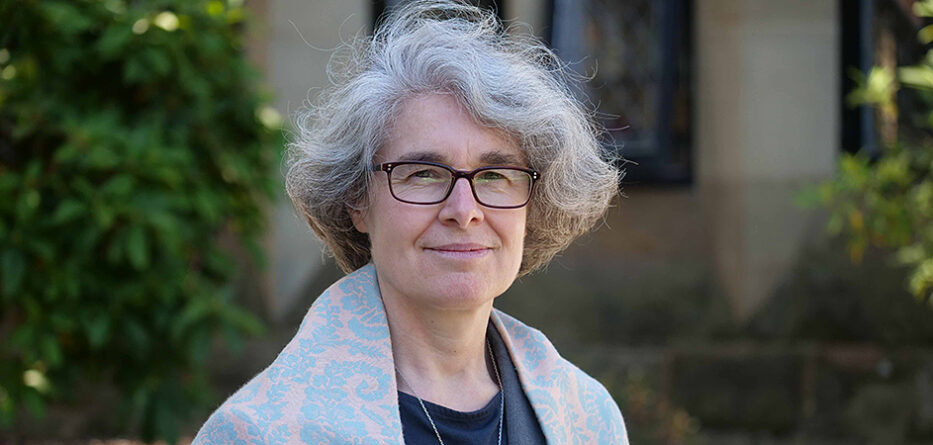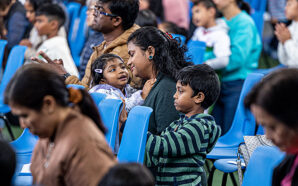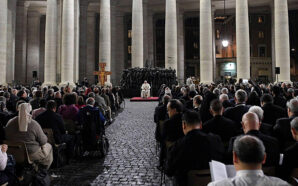The woman charged with spreading Pope Francis’ vision of a synodal Church focused on mission says synodality is a way of eradicating clericalism and increasing women’s participation in the Church.
Sr Nathalie Becquart, a member of the Xaviere Sisters in France and Undersecretary of the Synod of Bishops, said the last synod had discerned “very clearly” that everyone is calling for women’s participation in the Church, especially in leadership roles and decision-making processes.
“We see that we are called to be a synodal Church and get rid of clericalism; synodal is a way of getting rid of a clerical church,” she said in an interview with The Southern Cross during a visit to Adelaide yesterday.
Sr Nathalie met with Archdiocesan leaders, the Pastoral Services Team and addressed a public gathering of more than 150 at the Grange Golf Club in the evening before departing for Sydney where she has a speaking engagement in the Diocese of Paramatta.
“The key issue for Pope Francis is to have women in leadership and there are already many possible ways that could continue to grow,” she said.
“We need to think not only of the parish and diocesan structure but also Catholic universities, charities…we already have change, it needs to continue and we will see what happens.”
Acknowledging that some people would like to see female deacons, she said women can “already do a lot”.
“I really think the most important thing is to be together as men and women in the Church and in society, to find ways to collaborate, especially in leadership, because you are always better when you put together men and women, instead of just women or just men.”
Sr Nathalie said she was “surprised” to be asked to take on her current role, previously held by clergy, but after a period of discernment she thought “it’s a chance, as a woman, as a Sister who is not in the same type of relationship or position as a priest”.
And she stressed that she is not alone as a female leader in the Vatican.
“Pope Francis has appointed more and more women to the Vatican, especially leadership positions,” she said, referring to a number of senior dicastery positions and the inclusion of female staff in areas previously restricted to clergy.
“I am also the fruit of an experience in France in which our bishops appointed women as diocesan chancellors or directors of diocesan offices. Even at the Bishops Conferences now there are three or four countries with women as general secretaries – Scandinavia, South Africa, Germany and more recently South Sudan.”
Sr Nathalie, who was born in Fontainebleau in 1969, previously worked in leadership roles in youth ministry in France and was heavily involved in the preparation and staging of the Synod on Youth in 2018.
“I would say I think I have been rather lucky because I have had a rather positive experience (as a woman),” she said.
“When I was appointed director of the National Office for Youth and Vocations at the French Bishops Conference I was the first woman, before it has always been a priest.
“I had a good experience working together with clergy, and I had a very good relationship with the bishops in France and a good experience also with the male priests or Religious who were in my team.”
As she travels the world sharing Pope Francis’ vision for a missionary synodal Church, switching between English, French and Italian as she goes, Sr Nathalie said one of the greatest joys is “contemplating the work of the Holy Spirit all over the world in so many different ways”.
“So many people are trying to serve, it’s really a blessing,” she said.
Far from being a bureaucratic role, she described her position as “mainly about accompanying and promoting this process of synodality” and her motivation – to serve the people – is the same as when she was a young volunteer working in Beirut, Lebanon, when the seed of her vocation was planted.
Being based in Rome, she encounters people from all over the world, either in person or on Zoom.
“For me that’s really something that I like, seeing so many different cultures, contexts and languages in the Church,” she said.
“I never imagined I would be out of my community on a daily basis, but I really feel that in this service I can live my vocation and charism as a Xaviere Sister.”
Sr Nathalie said while you might think that working in Rome would mean being “mainly in Church territory”, the emphasis of the Synod on ecumenical dialogue brought her into contact with people from all walks of life such as political, business and faith leaders.
This was very much in line with the charism of her Order, founded on Ignatian spirituality: “This dialogue…for me is something very important, and also for the Church, not just to be amongst ourselves.”
And, of course, there is the connection with Pope Francis to whom the Council, established during Vatican II, reports.
“We have meetings in different ways with him (the Pope),” she said.
“As Under Secretaries sometimes we have meetings with Pope Francis. But there are other times that I meet him.
“For instance, I met him last Thursday because I was also asked to take part in a meeting organised by the Dicastery for Inter-religious Dialogue on Women and we had a private audience with him.
“He took time to greet everyone, we had a short conversation and he asked me how the Synod was going and I told him I was going to Australia and then Oceania for the assembly (for the Continental Stage of the Synod).
“Then, of course, being at the Vatican I take part in some celebrations; I also saw him last week at Vespers for Christian Unity.”
She said during these regular meetings and even before she was appointed Under Secretary, she found Francis to be “very simple”.
“What really strikes me from the beginning…is that when he meets you or greets you he is really present as if he is there only for you,” she explained.
“He has a quality of presence and relationship which is very touching, because he’s very dedicated to the person he’s meeting.”
With her apartment within the Vatican walls, amongst cardinals and bishops and with a “beautiful view of St Peter’s”, Sr Nathalie said what she saw from the “inside” was very different to the view portrayed in the media.
“Many people see the Vatican from the outside, so sometimes you can look at the Vatican as having a lot of problems, fights, or as something very important and powerful,” she said.
“It’s a very different view from when you work inside. It’s men and women, there’s not a lot of means and resources, sometimes it’s less than what you could have in a big diocese or bishops’ conference.
“I can say unless you are really inside you don’t really know and understand what the Vatican is…and because it’s in Italy it’s shaped by the Italian culture.
“It’s a big change for me not living in a community…I often think of missionaries who had to go and work in another country, it’s an experience. Even if my Italian friends are very close, it’s still so different.”
To view the live stream of Sr Nathalie’s presentation in Adelaide, visit www.adelaide.catholic.org.au
Jenny Brinkworth is the Editor of The Southern Cross and the Director of Catholic Communications in the Catholic Archdiocese of Adelaide.
Reproduced with permission from The Southern Cross, the news publication of the Catholic Archdiocese of Adelaide.








